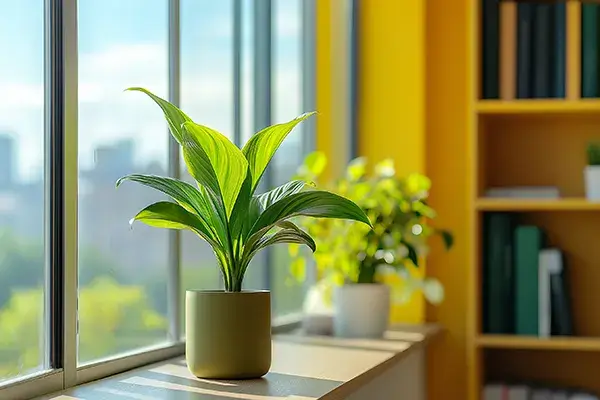Looking to breathe new life into your workspace? Small plants for your office desk are the perfect solution. These compact green companions not only add a touch of nature to your work environment but also offer numerous benefits for your well-being and productivity.
From improving air quality to reducing stress, desk plants can transform your office into a more vibrant and pleasant space. Whether you're a seasoned plant parent or a novice gardener, there's a wide variety of low-maintenance options suitable for even the busiest professionals. In this article, you'll discover the best small plants for your office desk and learn how to care for them effortlessly.
Benefits of Small Plants for Office Desks
Small plants on office desks offer numerous advantages for employees and the work environment. Here are two key benefits of incorporating these green companions into your workspace:
Improved Air Quality
Small desk plants contribute to better air quality in offices. While their impact may not be as significant as larger plants, they still help purify the air. Peace Lilies, Spider Plants, and Pothos are excellent air-purifying options for desk spaces. Studies show that offices with plants report improved perceived air quality, partly due to the psychological effect of being around greenery.
Stress Reduction and Productivity Boost
Having small plants on office desks can significantly reduce stress levels among employees. A study involving 63 Japanese office workers found that desk plants decreased psychological and physiological stress. This stress reduction can lead to improved focus and productivity, creating a more positive work environment. The presence of plants also enhances mood and job satisfaction, contributing to overall well-being in the workplace.
Top Small Plants for Office Desks
Choose from a variety of small plants to enhance your office desk space. These compact options offer both aesthetic appeal and practical benefits for your work environment.
Succulents and Cacti
Succulents and cacti are ideal for office desks due to their low maintenance requirements. Aloe Vera, 'Minibelle', and 'Tiger Tooth' varieties thrive in bright light and need minimal watering. Plant them in a sandy cactus mix for optimal drainage. Remember, Aloe Vera is toxic to humans and animals.
Air Plants
Air plants (Tillandsia) are soil-free options that absorb nutrients through their leaves. They're perfect for office settings but need regular misting and occasional soaking. These plants tolerate low light conditions but prefer bright, indirect light. Their unique appearance adds visual interest to your workspace.
Bonsai Trees
Bonsai trees bring a touch of serenity to your office desk. These miniature trees require regular pruning and shaping to maintain their compact size. Choose from varieties like Ficus, Jade, or Chinese Elm for indoor environments. Bonsai trees need consistent watering and proper light exposure to thrive.
Caring for Your Office Desk Plants
Proper care ensures your office desk plants thrive and continue to enhance your workspace. Here's how to manage their essential needs:
Watering and Light Requirements
Watering needs vary by plant species. Pothos tolerates inconsistent watering, needing water once weekly. Spider plants prefer moist soil, requiring regular watering. ZZ plants need watering every 1-2 weeks, while snake plants and aloe vera thrive with less frequent watering. For light, pothos and spider plants prefer indirect light, avoiding direct sunlight and air conditioning vents.
Soil and Fertiliser Needs
Most office desk plants thrive in well-draining potting soil. Use a balanced, water-soluble fertiliser monthly during the growing season (spring and summer). Reduce fertilisation in autumn and winter when plant growth slows. Succulents and cacti require specialised, fast-draining soil mixes and less frequent fertilisation to prevent overfeeding.
Stylish Ways to Display Small Plants on Your Desk
Elevate your office space with these creative plant display ideas:
- Geometric terrariums: Showcase succulents in modern glass containers
- Hanging planters: Utilise vertical space with suspended pots
- Miniature plant stands: Add height variety with tiered displays
- Repurposed containers: Use unique items like teacups or vintage tins
- Magnetic planters: Attach small pots to metal surfaces for a space-saving solution
- Desktop herb garden: Grow fragrant herbs in a compact container
- Floating shelves: Install small shelves above your desk for a green backdrop
These options maximise desk space while adding a touch of nature to your workspace.
Potential Drawbacks of Office Plants
While small plants can enhance your office desk, they come with certain challenges. You'll need to consider potential toxicity, specific lighting requirements, and proper watering to maintain their health. Some popular office plants contain harmful substances if ingested, while others demand particular light conditions to thrive. Overwatering is a common issue, especially in low-light environments. Understanding these drawbacks helps you choose the right plant for your workspace.
Conclusion
Small plants for your office desk offer numerous benefits, from improved air quality to reduced stress. With options like succulents, air plants, and bonsai trees, you'll find a plant that suits your space and care abilities. Remember to consider factors such as lighting, watering needs, and potential toxicity when choosing your desk companion. By incorporating these green additions and following proper care guidelines, you'll create a more vibrant, productive workspace that enhances your well-being and job satisfaction.
Key Takeaways
- Small desk plants improve air quality and reduce stress in office environments
- Succulents, air plants, and bonsai trees are ideal low-maintenance options for office desks
- Proper watering, light exposure, and soil conditions are crucial for plant health
- Creative display ideas like terrariums and hanging planters maximise desk space
- Consider potential drawbacks such as toxicity and specific care requirements when choosing office plants
- Incorporating small plants can boost productivity and create a more vibrant workspace

